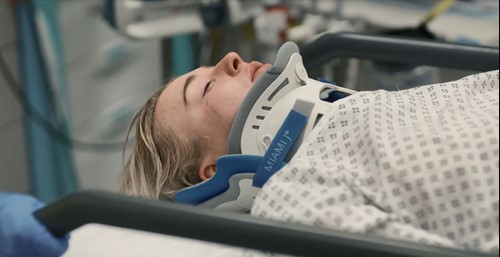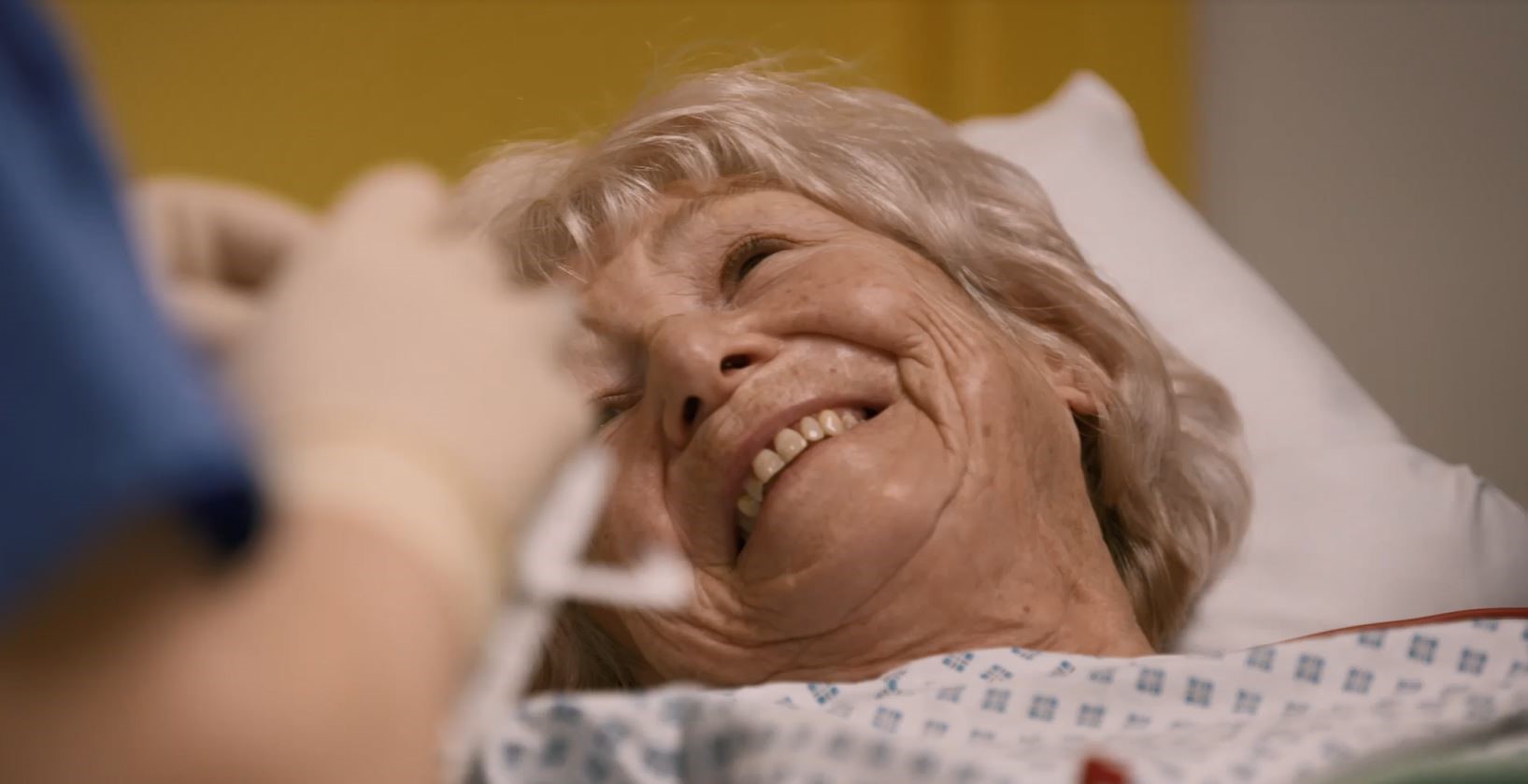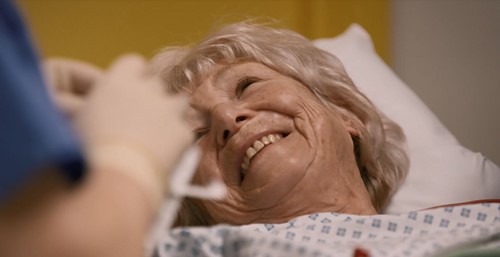Episode 3
When 64 year old Barry is rushed into resus with suspected sepsis, Doctor Jamil Aslam, is immediately worried. Struggling to breathe and on the maximum dose of oxygen, Barry’s body is shutting down fast. As staff desperately battle to stablise him, Barry’s condition deteriorates, and Jamil knows that it’s a race against time to save his critically ill patient.
Next, when a call comes in about a terrifying horse-riding accident, staff in the Emergency Department are immediately on high alert. Lucy’s horse has somersaulted whilst jumping a huge fence – catapulting her to the ground and then landing on top of her. Whilst Lucy has obvious tenderness on her left side, it’s her feet that Trauma Team Leader Paul Hancock is most worried about. With no feeling below mid-calf, Paul fears Lucy may have suffered significant nerve damage, which may mean that she could be paralysed.
Across the hospital Ena is rushed in for a high-risk emergency surgery. Having discovered that she has a highly aggressive form of bladder cancer, Ena is now facing a complex 7 hour procedure, where urologist, Mr Gommersall will use a robot to remove her bladder in a desperate attempt to stop the cancer from spreading.
Back in the Emergency Department, 78 year old Alan has suffered one of the worst compound fractures that the team has ever seen. Out walking his dog, Alan tripped and has been left with a significant amount of bone which has broken through the skin of his ankle. Doctor Waheed Ghani knows that every second counts if he is to avoid infection - which in a man of Alan’s age - could well be life threatening.
Finally, student paramedic Ethan is rushed in after an accident on the way home from a shift on the ambulances. Involved in a head-on car crash, Ethan is in great pain from an ankle injury. But it’s firmness in his stomach that Trauma Team Leader Richard Fawcett is immediately worried about. He knows that this could be a sign of life-threatening internal bleeding and the race is on to get Ethan to scan to diagnose him, before it’s too late.

Trainee teacher crushed by horse
A 21-year-old student teacher who can no longer feel her left leg after being crushed by her horse is to feature in the latest episode of 999: Critical Condition, the exclusive documentary charting the life and death decisions and actions of staff at Royals Stoke University Hospital.
Lucy Croucher, of Winsford, Cheshire was airlifted to the Major Trauma Centre after coming off her horse and being crushed by him while trying to jump a fence in Horton, near Nantwich in Jauary this year.
Film crews from Brinkworth Productions were there to capture Lucy’s arrival at Royal Stoke Emergency Department where doctors were originally concerned she was paralysed. Her story will be included in 999: Critical Condition on Wednesday (24 May) at 9pm on Channel 5.
Today Lucy, who has ridden since she was 18 months old, said: “We went to jump a fence and the ground was really boggy. The horse sank in the mud and we both went over. He’s a big horse at 18 hands and very heavy. He landed on top of me and completely crushed me. It was a horrible experience and one I would never want to live through again. I passed out and when I came too there was the worry that I couldn’t feel my legs.”
She added: “At first doctors thought I might have damaged my spine, but instead I have been diagnosed with functional neurological disorder which means I just can’t feel my left leg. The nerves in my spine have been damaged by the trauma and they’ve not rebooted. The doctors think the feeling might come back at some point but no-one knows for sure.”
Lucy, who is studying to be a primary school teacher at Staffordshire University, is not letting her injuries stop her though. After spending five weeks at Royal Stoke she got back in the saddle just eight weeks after the accident and will be competing for the first time following the incident at the International Side Saddle Show in Aintree this weekend.
“I got back on Mambo after eight weeks. It was terrifying but good to be back in the saddle again. IK have to adapt and change the way I ride and get on and off because I can’t feel my leg properly but I am determined it won’t stop me doing what I love,” Lucy explained.
She added: “I had great care every step on the way at Stoke and I keep bumping into the student nurses who took care of me on campus at university who still ask me how I am doing.”


A Shropshire pensioner is living a healthy retirement thanks to live-saving surgery at University Hospitals of North Midlands.
Ena Plant , of Jackfield, near Ironbridge, had her bladder removed at Royal Stoke University Hospital after doctors diagnosed her wife bladder cancer.
The 76-year-old’s story featured in this week’s episode of 999: Critical Condition on Wednesday on Channel 5 and is now available on demand at My 5.
Today Ena said: “I was having trouble going to the toilet and had blood in my urine but there was no infection. It was only after I started to develop severe pain that I was referred for a scan that they discovered a big tumour on the side of my bladder and a smaller one inside.”
She was referred to the specialist oncology service at Royal Stoke to have non-invasive surgery using a new state-of-the-art surgical robot.
The intuitive Da Vinci Xi dual console robotic system costing £2.0 million was funded by the Denise Coates Foundation as part of their support for the development of the UHNM’s cancer services which has been delivered via an £8.4 million grant to UHNM Charity.
The technology enables surgeons to perform advanced robotic procedures using cutting-edge technology.
Ena, who now uses a urostomy or bag, said: “Mr Gommersall explained what would happen during my surgery so I was excited to be able to watch it on the television.
“The procedure itself went really well and they managed to get all the cancer and I’m doing okay now. I am always on the go and thankfully have got used to using the bag on my own so I am back in the garden and able to do my hanging baskets.”
Robotic surgery has been performed at UHNM since 2017. Urologist Mr Lyndon Gommersall who specialises in robotic pelvic cancer surgery to treat advanced bladder cancer patients and treated grandmother Ena, said: “Urology has embraced technology over the last 20 years using minimally invasive laparoscopic keyhole surgery and now robotic surgery. It has been really exciting to be able to integrate this technology in to our working lives to help patients recover more rapidly after major surgery.
“I am proud to work at UHNM in a team of surgeons that can offer cutting edge care for patients in Staffordshire, Shropshire and beyond.”


